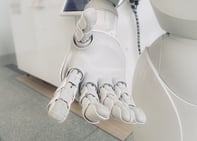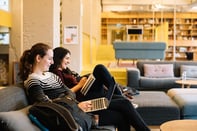Published on
Creating an Education for Industry 4.0

COVID-19 has put the shift to Industry 4.0 into hyperdrive. Futurists have long anticipated this change—a leap beyond the previous industrial revolutions of mechanized production with water and steam power, of mass production with electricity, and of automation with electronics and information technology. Now we are witnessing a convergence of the physical world, data, and life itself in fields such as artificial intelligence, environmental sustainability, human health, and global connection. The pandemic, which highlights our global interdependence, has accelerated this process by decades as it threatens human health, devastates economies, and elevates issues of environmental damage, social division and inequality. There will be no return to the old normal but rather an advance towards new structures and solutions built with new tools.
Post-secondary education was already struggling to meet the economic, financial, political, and social challenges of the present and the future. To survive and thrive amid these difficulties, institutions must fashion creative and rapid-response innovations. There will be no more fixed five-year budgets or plans. Instead, we must move to continuous planning and change our structures to address student and societal needs more immediately. Our unswerving mission to prepare students for life and work in a rapidly changing global society requires us to embrace forward-looking experiences and education for “new-collar,” not “blue-collar” or “white-collar,” jobs and careers.
Some call it making our students future-proof or robot-proof–educated and empowered to do what machines cannot do as they replace whole sectors of employment vanish and new ones emerge. This requires a synergy of science and engineering, quantitative, and humanities acumen.
Work+, a program devised by Miami University’s regional campuses in collaboration with industry and state partners provides this kind of education–and students can graduate debt-free. They work part-time at a partner company for an average of 24 hours per week during the semester, during which they directly apply what they learn in the classroom, acquire new ideas and skills, engage professional models and mentors, and build a four-year resumé. The companies get bright, skilled, energetic workers with the potential to contribute long term. The program was modeled on Metropolitan College, a successful collaboration between the University of Louisville, Jefferson Community and Technical College, and United Parcel Service (UPS).
Students enjoy tremendous benefits from the Work+ program. As they earn their degree, they build a four-year record of work experience, which many new graduates currently lack, giving them a head start on their peers upon graduating. Students are employed in positions ranging from working on a production line with robotics to programming, engineering design, social media marketing, e-commerce, and finance. They are introduced to new ideas, skills, products, and processes as they appear in the workplace in real time, often before those innovations find their way to university campuses and classrooms. They work side by side with professionals whose example and expertise enrich their soft skills, including emotional intelligence, communication, and empathy.
Their real-world work happens in the context of their education, not only in their specific discipline but in the liberal arts as well. They are learning meaning, value, and purpose as they gain practical knowledge and build expertise. They are being shaped into leaders with a comprehensive mindset that considers, for example, not only whether we can do something but whether we should do it. It teaches them to question their decisions in the context of the impacting individual and societal wellbeing. One might expect that partner companies are seeking only engineering and technology students, but placements have been made across commerce, communications, criminal justice, health, English, psychology, and nursing.
For example, Work+ students are part of the Industry 4.0 group at of Thyssenkrupp Bilstein America Inc., where they learn engineering, design, and computer programming related to automation while they program collaborative robots (Cobots) and provide technical support for projects. Work+ students participated in the design, branding, and marketing of face masks to support Fischer Group’s switch to manufacturing them to fight the COVID-19 virus.
Companies also enjoy rich benefits from the program. They gain intelligent, focused, motivated, and enthusiastic employees, now and potentially for the long term. These young people bring the a rising generation’s perspective into the workplace while they are still encountering the fresh ideas and experiences of college through a rigorous curriculum. They spread out-of-the-box imagination, future-focused perspectives, and boundless optimism as well as sharp intellect, evidence-based exploration, critical thinking, and clear communication.
Work+ is a model for the future of education in its vision and content. It addresses the workplace’s immediate and future needs, and the financial challenges that many individuals and families face as a result of the cost of higher education. It unites the theoretical and the practical in a feedback loop that makes the participants well-informed and prepared students and professionals. No longer will they ask, “How am I going to use this course?” because the answer is often in their lived experience.
Work+ is a model for creating an Industry 4.0 educational experience. Its benefits extend beyond the great value of summer internships and co-op experiences. Work+ students are employees who are integrated into the company for years, and their tuition is fully paid in addition to a salary. They can take on added responsibility and leadership roles, and they progress through their education and career experiences at the company.
The program’s deep roots are a collaboration between higher education and industry–the Metropolitan College at the University of Louisville and UPS. It arrived at Miami University through their sharing of best practices and experiences, adapted for our region with a cohort of partnerships with smaller companies. It won support from the State of Ohio through a partnership with our state senator, Bill Coley, who introduced legislation signed by Gov. Mike DeWine on October 1st, 2020, requiring the Ohio Department of Higher Education to develop a Work+ template for public universities across the state.
The advent of Industry 4.0 generates challenges and opportunities across our society in general and higher education in particular. Those challenges and opportunities are best met by innovative ideas, synergies, and structures that address the good of the students, the workplace, and the whole society. The Work+ program is such an innovative idea.
Disclaimer: Embedded links in articles don’t represent author endorsement, but aim to provide readers with additional context and service.
Author Perspective: Administrator



